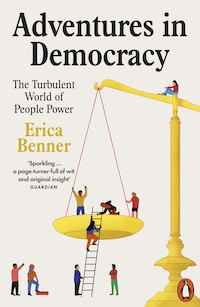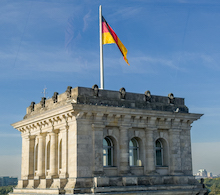Public ideas
Yearning for an authoritarian past
If you visit Berlin, you might care to spend an hour or two in the Volkspark Friedrichshain, East Berlin’s equivalent to the larger more developed Tiergarten in the West.
There you may meet a few old East Berliners, who will tell you how good it was before 1989. They aren’t communist ideologues; they’re quite apolitical in fact. But they miss the certainty and the security of old East Germany, the Deutsche Demokratische Republik. (Which was neither democratic or republican.) Of course they are no longer under surveillance, but the Stasi’s directions were directed only at party members, public servants and intellectuals: they didn’t bother the workers. In fact in the new Berlin they feel ignored, disconnected. In the old DDR they were so valued that they weren’t allowed to leave the country.
Hearing their stories is disconcerting for an Australian, but it probably wouldn’t be for British political philosopher Erica Benner, who writes in Inside Story about What the West forgot about democracy.
She explains why, to the disappointment of western liberals, people in countries such as the old Warsaw Bloc countries in East Europe are less than fully enthused about democracy, and they use their newfound freedoms to elect populist strongmen or strrongwomen. It’s not that they’re seduced by the populists’ claims. (Anyone who lived through Eastern European communism developed a good bullshit detector.) It is more about a disdain for what democracies display to the world:
Today, millions of people around the world crave freedom from authoritarian rule. Yet when they hear almost daily that the liberal heartlands are plagued with inflation, strikes, high crime rates, gun violence and voters who care little about truth, many of them doubt that democracy is the best alternative.

They react strongly to the way that the transition to democracy was accompanied by an exploitative form of capitalism, as if unrestrained markets and ever-widening inequality are an essential aspect of democracy. They observe the extraordinary fortunes that have passed to the owners of assets that were once in collective ownership. That isn’t the way economists’ textbooks said it would work with those funny little diagrams demonstrating that competition would ensure there were no excess profits.
Benner goes back to the roots of Athenian democracy, recounting that democracy was designed by wise people who realized that pre-democratic Athens was a dysfunctional oligarchy. Observing that “unequal societies are less stable, productive and humane than those where inequalities are held in check” they went about designing a political system that could keep these forces in check. Democracy was a solution to a practical problem about inequality.
About what democracy should be, she writes:
Democratic freedom isn’t a condition where my private wishes can roam unchecked and I am free to acquire as much power or wealth as I can without considering how this affects others. It’s a key part of a power-sharing scheme called democracy. What makes democratic freedom democratic is precisely that it sets limits on my personal freedoms within this scheme, leaving opportunities and decent options for everyone else.
Benner is author of Adventures in democracy: the turbulent world of people power. She spent an extended time In Poland after 1989, teaching and observing the transition from communism and central planning.
Lessons from Germany

Drooping a little
On Saturday Extra last week – Germany’s trains are running late: here’s why it really matters – Geraldine Doogue and Hamish MacDonald discussed Germany’s economic and political problems with Tobias Cremer, a Social Democratic member of the European Parliament.
The discussion is mainly about the Merkel Administration having made the country too dependent on Russia for energy, the rundown of the Bundeswehr, immigration, and the resurgence of the far right in recent elections. But it covers issues important for countries like Australia.
The cost of specialization
It is also about the way Germany’s own economic strength in manufacturing has had unforeseen consequences. Germany’s car industry has stood out for its excellence for a hundred years and more. They have brought the mechanical standards and reliability of the complex engineering of internal combustion engines, suspension systems, and all other aspects of car manufacturing up to high levels, unmatched by competitors. Excellence in mechanical engineering has been Germany’s strength.
But worldwide the car industry has changed. A car is now a battery on wheels, with fewer moving parts and using generic mechanical technologies. Much of a car’s value lies in its electronic systems controlling collision avoidance, road holding and navigation.
There is a lesson here not only in industrial policy, but also in the costs of excess specialization. Just a week earlier Wolfgang Munchau of Harvard’s Center for European Studies and Financial Times business editor, speaking on Radio National – Is Germany’s economic power under threat? – made the same point about Germany’s failure to adapt to a digital world.
Perhaps we should be relieved that the pain of the closure of our car industry is now behind us, but the lesson is about more than one industry: it’s about the need to have a workforce that’s adaptable and flexible. It’s also about the political power of successful industries: Germany’s car industry was so well enmeshed in the country’s political and bureaucratic establishment that policymakers didn’t see the changes coming.
The cost of an obsession with debt
For many sound reasons Germans are terrified of debt. Three times in the last hundred years – the end of the Weimar Republic, the end of the 1939-45 war, and the collapse of the DDR – Germans have found themselves holding worthless currency. Cremer warns that the deterioration of Germany’s once excellent infrastructure is a consequence, in part of the country’s fear of debt, even when it is used to fund productive assets.
We have a different history in Australia, but we have the same obsession with public debt, which has seen us under-invest in public assets, and has seen us privatize industries that should have been kept in public hands.
On religion and politics
Tobias Cremer is not only a politician. He is also a research fellow of Oxford’s faculty of theology and religion, and it is in that role that Doogue and Macdonald question him about the way Christians are so attracted to the political far right, even though the public morality of the far right is at variance with so much Christian moral theology.
Cremer points out that to many, particularly among the “white” working class, “Christian” is a tribal marker, with little, if any, association with Christian theology. In fact the right’s emphasis on the individual and its degrading of the collective is quite at odds with the morality of Christian scripture. But as a brand and an identity “Christian”, is politically powerful.
The time will come when reference to atheist “Christians” won’t seem to be contradictory.